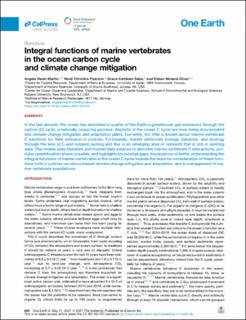| dc.contributor.author | Martin, Angela Helen | |
| dc.contributor.author | Pearson, Heidi | |
| dc.contributor.author | Saba, Grace | |
| dc.contributor.author | Olsen, Esben Moland | |
| dc.date.accessioned | 2021-06-29T11:07:44Z | |
| dc.date.available | 2021-06-29T11:07:44Z | |
| dc.date.created | 2021-05-22T10:38:03Z | |
| dc.date.issued | 2021 | |
| dc.identifier.citation | One Earth. 2021, 4 (5), 680-693. | |
| dc.identifier.issn | 2590-3330 | |
| dc.identifier.uri | https://hdl.handle.net/11250/2762306 | |
| dc.description.abstract | In the last decade, the ocean has absorbed a quarter of the Earth’s greenhouse gas emissions through the carbon (C) cycle, a naturally occurring process. Aspects of the ocean C cycle are now being incorporated into climate change mitigation and adaptation plans. Currently, too little is known about marine vertebrate C functions for their inclusion in policies. Fortunately, marine vertebrate biology, behavior, and ecology through the lens of C and nutrient cycling and flux is an emerging area of research that is rich in existing data. This review uses literature and trusted data sources to describe marine vertebrate C interactions, provides quantification where possible, and highlights knowledge gaps. Implications of better understanding the integral functions of marine vertebrates in the ocean C cycle include the need for consideration of these functions both in policies on nature-based climate change mitigation and adaptation, and in management of marine vertebrate populations. | |
| dc.language.iso | eng | |
| dc.title | Integral functions of marine vertebrates in the ocean carbon cycle and climate change mitigation | |
| dc.type | Peer reviewed | |
| dc.type | Journal article | |
| dc.description.version | publishedVersion | |
| dc.source.pagenumber | 680-693 | |
| dc.source.volume | 4 | |
| dc.source.journal | One Earth | |
| dc.source.issue | 5 | |
| dc.identifier.doi | 10.1016/j.oneear.2021.04.019 | |
| dc.identifier.cristin | 1911402 | |
| dc.relation.project | Norges forskningsråd: 294926 | |
| cristin.ispublished | true | |
| cristin.fulltext | original | |
| cristin.qualitycode | 1 | |
